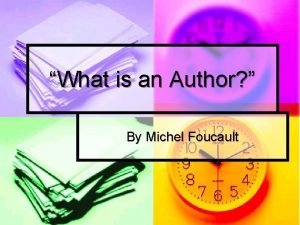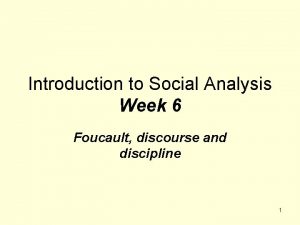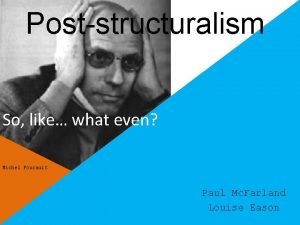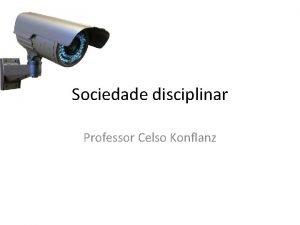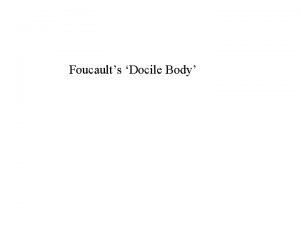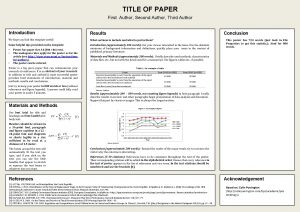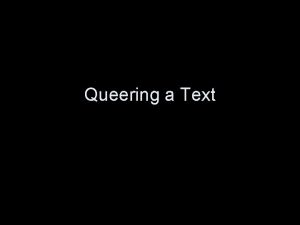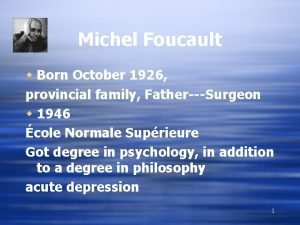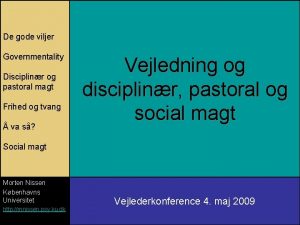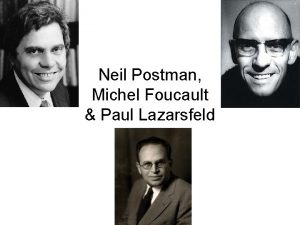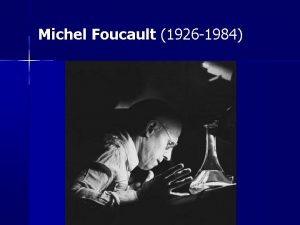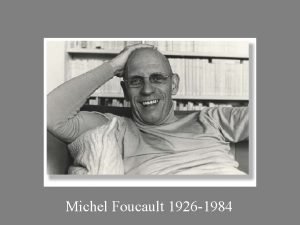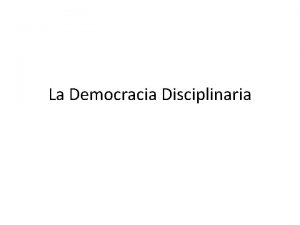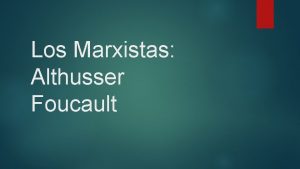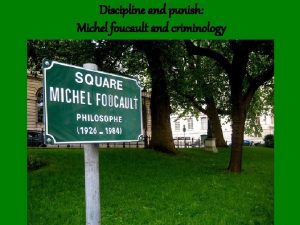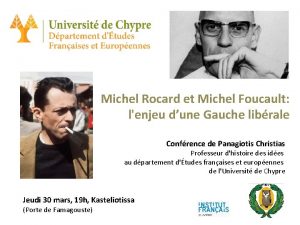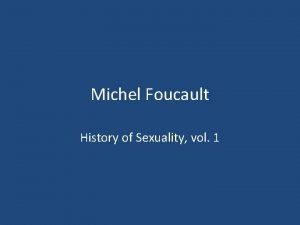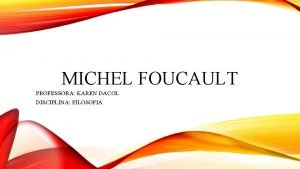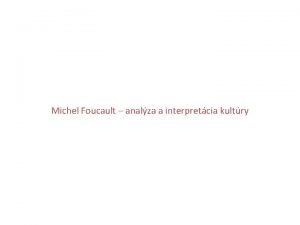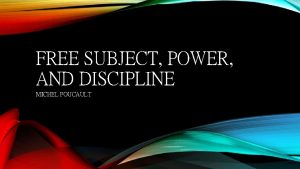Lecture 10 Author Critiques 1 Michel Foucault What














- Slides: 14


Lecture 10 Author Critiques: 1. Michel Foucault: “What is an Author? ” Literary Criticism and Theory ﻋﻤﺎﺩﺓ ﺍﻟﺘﻌﻠﻢ ﺍﻹﻟﻜﺘﺮﻭﻧﻲ ﻭﺍﻟﺘﻌﻠﻴﻢ ﻋﻦ ﺑﻌﺪ Deanship of E-Learning and Distance Education [ ] ﺟﺎﻣﻌﺔ ﺍﻟﻤﻠﻚ ﻓﻴﺼﻞ King Faisal University

Foucault’s Title v Even with his title, Foucault is being provocative, taking a given and turning it into a problem. His question ("What is an Author? ") might even seem pointless at first, so accustomed have we all become to thinking about authors and authorship. ﻋﻤﺎﺩﺓ ﺍﻟﺘﻌﻠﻢ ﺍﻹﻟﻜﺘﺮﻭﻧﻲ ﻭﺍﻟﺘﻌﻠﻴﻢ ﻋﻦ ﺑﻌﺪ Deanship of E-Learning and Distance Education [ 3 ] ﺟﺎﻣﻌﺔ ﺍﻟﻤﻠﻚ ﻓﻴﺼﻞ King Faisal University

The idea of the Death of the Author v Foucault questions the most basic assumptions about authorship. He reminds us that the concept of authorship hasn't always existed. It "came into being, ” he explains, at a particular moment in history, and it may pass out of being at some future moment. v Foucault also questions our habit of thinking about authors as individuals, heroic figures who somehow transcend or exist outside history (Shakespeare as a genius for all times and all place). v Why, he wonders, are we so strongly inclined to view authors in that way? Why are we often so resistant to the notion that authors are products of their times? ﻋﻤﺎﺩﺓ ﺍﻟﺘﻌﻠﻢ ﺍﻹﻟﻜﺘﺮﻭﻧﻲ ﻭﺍﻟﺘﻌﻠﻴﻢ ﻋﻦ ﺑﻌﺪ Deanship of E-Learning and Distance Education [ 4 ] ﺟﺎﻣﻌﺔ ﺍﻟﻤﻠﻚ ﻓﻴﺼﻞ King Faisal University

The idea of the Death of the Author v According to Foucault, Barthes had urged critics to realize that they could "do without [the author] and study the work itself. ” This urging, Foucault implies, is not realistic. v Foucault suggests that critics like Barthes and Derrida never really get rid of the author, but instead merely reassigns the author's powers and privileges to "writing" or to "language itself. " v Foucault doesn't want his readers to assume that the question of authorship that's already been solved by critics like Barthes and Derrida. He tries to show that neither Barthes nor Derrida has broken away from the question of the author--much less solved it. ﻋﻤﺎﺩﺓ ﺍﻟﺘﻌﻠﻢ ﺍﻹﻟﻜﺘﺮﻭﻧﻲ ﻭﺍﻟﺘﻌﻠﻴﻢ ﻋﻦ ﺑﻌﺪ Deanship of E-Learning and Distance Education [ 5 ] ﺟﺎﻣﻌﺔ ﺍﻟﻤﻠﻚ ﻓﻴﺼﻞ King Faisal University

The Author as a Classificatory Function v Foucault asks us to think about the ways in which an author's name "functions" in our society. After raising questions about the functions of proper names, he goes on to say that the names of authors often serve a "classifactory" function. v Think about how the average bookstore is organized. When you go to the bookstore looking for Oliver Twist, most of the time you will search under the section: Charles Dickens, or you will ask for the novels of Charles Dickens. It probably wouldn't even occur to you to make your search in any other way. It’s almost unconscious. ﻋﻤﺎﺩﺓ ﺍﻟﺘﻌﻠﻢ ﺍﻹﻟﻜﺘﺮﻭﻧﻲ ﻭﺍﻟﺘﻌﻠﻴﻢ ﻋﻦ ﺑﻌﺪ Deanship of E-Learning and Distance Education [ 6 ] ﺟﺎﻣﻌﺔ ﺍﻟﻤﻠﻚ ﻓﻴﺼﻞ King Faisal University

The “Author Function” v Now, Foucault asks, why do you--why do most of us--assume that it's "natural" for bookstores to classify books according to the names of their authors? What would happen to Oliver Twist if scholars were to discover that it hadn't been written by Charles Dickens? Wouldn't most bookstores, and wouldn't most of us, feel that the novel would have to be reclassified in light of that discovery? Why should we feel that way? After all, the words of the novel wouldn't have changed, would they? v Foucault here introduces his concept of the "author function. " It is not a person and it should not be confused with either the "author" or the "writer. " The "author function" is more like a set of beliefs or assumptions governing the production, circulation, classification and consumption of texts. ﻋﻤﺎﺩﺓ ﺍﻟﺘﻌﻠﻢ ﺍﻹﻟﻜﺘﺮﻭﻧﻲ ﻭﺍﻟﺘﻌﻠﻴﻢ ﻋﻦ ﺑﻌﺪ Deanship of E-Learning and Distance Education [ 7 ] ﺟﺎﻣﻌﺔ ﺍﻟﻤﻠﻚ ﻓﻴﺼﻞ King Faisal University

Characteristics of the “Author Function” v Foucault identifies and describes four characteristics of the "author function”: 1. The "author function" is linked to the legal system and arises as a result of the need to punish those responsible for transgressive statements. There is the need here to have names attached to statements made in case there is a need to punish someone for transgressive things that get said. 2. The "author function" does not affect all texts in the same way. For example, it doesn't seem to affect scientific texts as much as it affects literary texts. If a chemistry teacher is talking about the periodic table, you probably wouldn't stop her and say, "Wait a minute--who's the author of this table? " If I'm talking about a poem, however, you might very well stop me and ask me about its author. ﻋﻤﺎﺩﺓ ﺍﻟﺘﻌﻠﻢ ﺍﻹﻟﻜﺘﺮﻭﻧﻲ ﻭﺍﻟﺘﻌﻠﻴﻢ ﻋﻦ ﺑﻌﺪ Deanship of E-Learning and Distance Education [ 8 ] ﺟﺎﻣﻌﺔ ﺍﻟﻤﻠﻚ ﻓﻴﺼﻞ King Faisal University

Four Characteristics of the “Author Function” 3. The "author function" is more complex than it seems to be. This is one of the most difficult points in the essay. To illustrate, Foucault gives the example of the editorial problem of attribution-- the problem of deciding whether or not a given text should be attributed to a particular author. This problem may seem rather trivial, since most of the literary texts that we study have already been reliably attributed to an author. Imagine, however, a case in which a scholar discovered a long-forgotten poem whose author was completely unknown. Imagine, furthermore, that the scholar had a hunch that the author of the poem was William Shakespeare. What would the scholar have to do, what rules would she have to observe, what standards would she have to meet, in order to convince everyone else that she was right? ﻋﻤﺎﺩﺓ ﺍﻟﺘﻌﻠﻢ ﺍﻹﻟﻜﺘﺮﻭﻧﻲ ﻭﺍﻟﺘﻌﻠﻴﻢ ﻋﻦ ﺑﻌﺪ Deanship of E-Learning and Distance Education [ 9 ] ﺟﺎﻣﻌﺔ ﺍﻟﻤﻠﻚ ﻓﻴﺼﻞ King Faisal University

Four Characteristics of the “Author Function” 4. The term "author" doesn't refer purely and simply to a real individual. The "author" is much like the "narrator, " Foucault suggests, in that he or she can be an "alter ego" for the actual flesh-and-blood "writer. ” ﻋﻤﺎﺩﺓ ﺍﻟﺘﻌﻠﻢ ﺍﻹﻟﻜﺘﺮﻭﻧﻲ ﻭﺍﻟﺘﻌﻠﻴﻢ ﻋﻦ ﺑﻌﺪ Deanship of E-Learning and Distance Education [ 10 ] ﺟﺎﻣﻌﺔ ﺍﻟﻤﻠﻚ ﻓﻴﺼﻞ King Faisal University

“Author Function” Applies to Discourse v Foucault then shows that the "author function" applies not just to individual works, but also to larger discourses. This, then, is the famous section on "founders of discursivity” – thinkers like Marx or Freud who produce their own texts (books), and "the possibilities or the rules for the formation of other texts. ” v He raises the possibility of doing a "historical analysis of discourse, " and he notes that the "author function" has operated differently in different places and at different times. v Remember that he began this essay by questioning our tendency to imagine "authors" as individuals isolated from the rest of society. ﻋﻤﺎﺩﺓ ﺍﻟﺘﻌﻠﻢ ﺍﻹﻟﻜﺘﺮﻭﻧﻲ ﻭﺍﻟﺘﻌﻠﻴﻢ ﻋﻦ ﺑﻌﺪ Deanship of E-Learning and Distance Education [ 11 ] ﺟﺎﻣﻌﺔ ﺍﻟﻤﻠﻚ ﻓﻴﺼﻞ King Faisal University

“Author Function” Applies to Discourse v Foucault, in the end, argues that the author is not a source of infinite meaning, but rather part of a system of beliefs that serve to limit and restrict meaning. For example: we often appeal to ideas of "authorial intention” to limit what someone might say about a text, or mark some interpretations and commentaries as illegitimate. v At the very end, Foucault returns to Barthes and agrees that the "author function" may soon "disappear. " He disagrees, though, that instead of the limiting and restrictive "author function, " we will have some kind of absolute freedom. Most likely, one set of restrictions and limits (the author function) will give way to another set since, Foucault insists, there must and will always be some "system of constraint" working upon us. ﻋﻤﺎﺩﺓ ﺍﻟﺘﻌﻠﻢ ﺍﻹﻟﻜﺘﺮﻭﻧﻲ ﻭﺍﻟﺘﻌﻠﻴﻢ ﻋﻦ ﺑﻌﺪ Deanship of E-Learning and Distance Education [ 12 ] ﺟﺎﻣﻌﺔ ﺍﻟﻤﻠﻚ ﻓﻴﺼﻞ King Faisal University

Sources v Foucault, M. (1977). “What is an author? ” Language, counter-memory, practice (pp. 113 -138). Ithaca, N. Y. : Cornell University Press. ﻋﻤﺎﺩﺓ ﺍﻟﺘﻌﻠﻢ ﺍﻹﻟﻜﺘﺮﻭﻧﻲ ﻭﺍﻟﺘﻌﻠﻴﻢ ﻋﻦ ﺑﻌﺪ Deanship of E-Learning and Distance Education [ 13 ] ﺟﺎﻣﻌﺔ ﺍﻟﻤﻠﻚ ﻓﻴﺼﻞ King Faisal University

 Michel foucault what is an author
Michel foucault what is an author Michel foucault pensamiento
Michel foucault pensamiento Michel foucault magt
Michel foucault magt Michel foucault critical theory
Michel foucault critical theory Post structuralism in architecture
Post structuralism in architecture Michel foucault
Michel foucault Michel foucault summary
Michel foucault summary El orden del discurso de michel foucault mapa conceptual
El orden del discurso de michel foucault mapa conceptual Michel foucault
Michel foucault Michel foucault docile bodies
Michel foucault docile bodies First author second author third author
First author second author third author 01:640:244 lecture notes - lecture 15: plat, idah, farad
01:640:244 lecture notes - lecture 15: plat, idah, farad Friendship as a way of life foucault
Friendship as a way of life foucault Panopticon
Panopticon Disciplinær magt
Disciplinær magt
